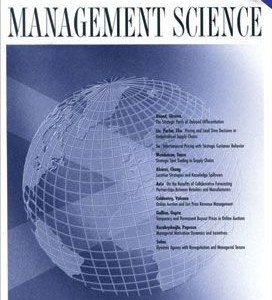
\Van Witteloostuijn\, A. (1998). Bridging behavioral and economic theories of decline: Organizational inertia, strategic competition, and chronic failure Management Science, 44(4):501--519.
-
Affiliated author
-
Publication year1998
-
JournalManagement Science
This paper is another plea for bridging behavioral and economic approaches to the study of competition in markets and strategy making by firms. The arguments focus on a specific case in point: the behavioral theory of organizational decline and the economic modeling of immediate exit. The arguments come in three steps. First, the literature on organizational decline is reviewed by organizing a framework that summarizes arguments from varying economic and organizational perspectives that have, for the most part, developed independently. Observations from empirical and theoretical studies are combined in order to investigate the causes, conditions, courses, and consequences of organizational downturn. Second, a theoretical argument is developed that explains voluntary exit and chronic failure by introducing a proxy of organizational inertia in a model of strategic Cournot duopoly. The key assumptions, which have a behavioral flavour that seemingly contradicts orthodox economics, are grounded in the theoretical and empirical literatures. The results of the model support the claim that 'pure profit maximizing behavior may be at the expense of organizational survival' (D'Aveni 1990, p. 135). Third, by formulating two hypotheses and presenting tentative evidence from the chemical industry, the paper hopes to convincingly argue that such integrative models lead to empirical testing of interesting hypotheses. A key finding here is that inefficient firms may outlast their efficient rivals (cf. D'Aveni 1989a).